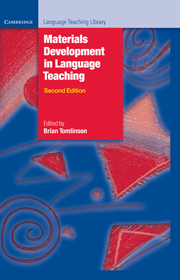Book contents
- Frontmatter
- Contents
- Preface
- Glossary of basic terms for materials development in language teaching
- Acknowledgements
- 1 Introduction: principles and procedures of materials development
- Part A Data collection and materials development
- 2 Using corpora in the language classroom
- 3 Concordances in the classroom without a computer: assembling and exploiting concordances of common words
- 4 Telling tails: grammar, the spoken language and materials development
- Comments on Part A
- Part B The process of materials writing
- 5 A framework for materials writing
- 6 Writing course materials for the world: a great compromise
- 7 How writers write: testimony from authors
- Comments on Part B
- Part C The process of materials evaluation
- 8 The analysis of language teaching materials: inside the Trojan Horse
- 9 Macro- and micro-evaluations of task-based teaching
- 10 What do teachers really want from coursebooks?
- 11 The process of evaluation: a publisher’s view
- Comments on Part C
- Part D The electronic delivery of materials
- 12 Developing language-learning materials with technology
- 13 New technologies to support language learning
- Comments on Part D
- Part E Ideas for materials development
- 14 Seeing what they mean: helping L2 readers to visualise
- 15 Squaring the circle – reconciling materials as constraint with materials as empowerment
- 16 Lozanov and the teaching text
- 17 Access-self materials
- Comments on Part E
- Conclusions
- Recommended reading
- Index
Preface
Published online by Cambridge University Press: 09 February 2023
- Frontmatter
- Contents
- Preface
- Glossary of basic terms for materials development in language teaching
- Acknowledgements
- 1 Introduction: principles and procedures of materials development
- Part A Data collection and materials development
- 2 Using corpora in the language classroom
- 3 Concordances in the classroom without a computer: assembling and exploiting concordances of common words
- 4 Telling tails: grammar, the spoken language and materials development
- Comments on Part A
- Part B The process of materials writing
- 5 A framework for materials writing
- 6 Writing course materials for the world: a great compromise
- 7 How writers write: testimony from authors
- Comments on Part B
- Part C The process of materials evaluation
- 8 The analysis of language teaching materials: inside the Trojan Horse
- 9 Macro- and micro-evaluations of task-based teaching
- 10 What do teachers really want from coursebooks?
- 11 The process of evaluation: a publisher’s view
- Comments on Part C
- Part D The electronic delivery of materials
- 12 Developing language-learning materials with technology
- 13 New technologies to support language learning
- Comments on Part D
- Part E Ideas for materials development
- 14 Seeing what they mean: helping L2 readers to visualise
- 15 Squaring the circle – reconciling materials as constraint with materials as empowerment
- 16 Lozanov and the teaching text
- 17 Access-self materials
- Comments on Part E
- Conclusions
- Recommended reading
- Index
Summary
This is a book of original chapters on current issues in materials development written by well-known contributors to the fields of applied linguistics and TEFL, most of whom have made presentations at MATSDA conferences.
MATSDA (The Materials Development Association) is an international materials development association founded in 1993 by Brian Tomlinson to contribute to the development of quality materials for learners of second and foreign languages. It aims to bring together teachers, researchers, materials writers and publishers in a joint endeavour to stimulate and support principled research, innovation and development. It does this by holding conferences, running workshops, providing consultants, publishing a journal (Folio) and stimulating books like this one.
For further information about MATSDA and for application forms for membership contact Brian Tomlinson, President of MATSDA, brianjohntomlinson@gmail.com, or go to the MATSDA website at www.matsda.org.uk . The main aim of this book is to further the work of MATSDA in providing information, ideas and stimulus which will facilitate the application of current thinking and research to the practical realities of developing and exploiting classroom materials. It also aims to stimulate further experimentation and innovation and thus to contribute to the continuing development of quality materials.
More and more applied linguistics and teacher development courses are including components on materials development (there are even MA courses focusing on L2 materials development at the International Graduate School of English in Seoul and at Leeds Metropolitan University), and more and more presentations at ELT conferences are focusing on issues related to the writing and exploitation of materials. And yet until 1998 few books had been published which investigated these issues. Materials Development for Language Teaching filled this gap by providing an opportunity for researchers, teachers, writers and publishers to communicate their informed views and suggestions to an audience seeking to gain new insights into the principles and procedures which were informing the current writing and exploitation of L2 materials. This revised edition of Materials Development for Language Teaching aims to retain the insights of the 1998 edition whilst adding new ideas and information related to developments since its initial publication.
Information
- Type
- Chapter
- Information
- Materials Development in Language Teaching , pp. vii - viiiPublisher: Cambridge University PressPrint publication year: 2011
